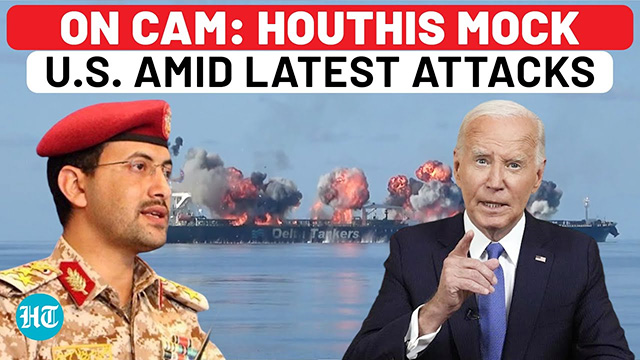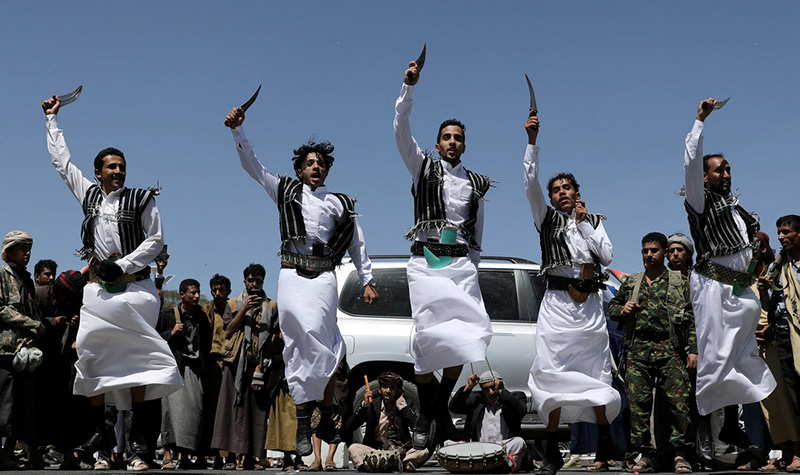
It turns out that the US cannot punish the Houthis from Yemen with any sanctions for the simple reason that the Houthis do not have accounts in US banks. This means that the absence of deposits in US banks guarantees against any sanctions!
The Brookings Institution writes:
Since the Houthis began attacking international shipping, media coverage and official statements have defined them as an Iranian proxy, but this downplays the Houthis’ threat and obscures the solution to it. In truth, the Houthis are not an Iranian proxy, even though they benefit from Iranian support. Rigorous definitions of the term “proxy” require that the sponsor has some means of controlling the proxy, as this is what differentiates a proxy from a partner/ally. But Iran lacks control over Houthi behavior and the Houthis are not acting primarily on behalf of Iran. This is important because the Houthis have demonstrated that they are often a more unpredictable and aggressive actor than their Iranian supporters.
Rather than being part of a centralized proxy system, the Houthis are an independent part of an increasingly complex network that allows them to work directly with over a dozen other groups to share expertise, coordinate activities, and even collaborate on joint attacks. This web enables a proliferation of chaos far beyond what Iran could orchestrate by itself, and beyond what it can effectively control. For this reason, attempts to address the Houthis’ threat by putting pressure on or engaging with Iran are doomed to fail.
The Houthis have consistently demonstrated that they retain sole authority over decisionmaking. At times, this has included taking actions that run counter to Iranian interests, as they did by declaring a unilateral cease-fire with Saudi Arabia in 2019.
The Houthis have also tried to mitigate their dependence on Iranian weapons flows, securing critical weapons parts from China, developing independent financing schemes for weapons procurement, and now pursuing military support from Russia. While still dependent on external parts, the Houthis have improved their ability to manufacture weapons inside of Yemen and have honed their independent expertise with new weapons, leveraging the fact that they are battle-tested.
The Houthis are less vulnerable than Iran to U.S. and international pressure, meaning they can afford to take greater risks. After several years of a Saudi-led coalition air campaign, the Houthis have grown accustomed to shielding their weapons supply from airstrikes, which is why recent U.S. and U.K. strikes have failed to significantly erode the Houthis’ attack capabilities.
The Houthis are also less vulnerable to international sanctions, as they operate largely outside of the international financial system.
The Houthis have presented themselves as the sole defenders of Yemen against external aggression — a narrative that depends on continued conflict. For years, that “aggression” came from the Saudi-led coalition, but this year, the narrative expanded to include the United States. And after January 20, Israel, arguably the most compelling foe for the Houthis and their supporters, joined the fray. In this way, Israel’s retaliatory strikes on Yemen in July will serve to greatly embolden the Houthis and incentivize them to pursue continued and even greater conflict with Israel, potentially even after a Gaza cease-fire is in place. While the Houthis have framed their maritime and regional attacks in the context of the Gaza war, Yemen analysts widely agree that the Houthi’s attacks are largely driven by their own domestic imperatives and regional ambitions, such that the threat will likely persist even after a Gaza cease-fire is in place.
In June, the Houthis claimed a joint attack with the Islamic Resistance of Iraq on Israel’s Haifa port. Such coordinated attacks from multiple directions could become more regular and complicate defensive efforts.
The Houthis’ cooperation could extend beyond the Middle East as well. U.S. officials recently reported that the Houthis are providing weapons to Somali militant group al-Shabab; coordinated attacks between the Houthis and al-Shabab against ships in the Gulf of Aden and the Arabian Sea could further raise the costs of maritime shipping and frustrate U.S. attempts to combat the attacks. While only a fraction of Houthi attacks have resulted in serious damage to ships, they have stopped major shippers from sailing through the Red Sea, forcing a diversion to longer and costlier routes with cascading consequences for the industry.
According to the Drewery World Container Index, container shipping costs have increased almost four-fold since the Houthi attacks began.1
This interconnected network also yields a faster proliferation of weapons and expertise. The Houthis have used years of war to hone their expertise and experiment with modifications to Iranian weapons — allowing them to successfully send drones over 1,600 miles and sink ships using unmanned boats. The Houthis’ direct engagement with groups like Hezbollah, who has similarly battled with its more powerful neighbors, was important to their development, and now the Houthis may share their expertise with other groups in the Middle East and Africa, exponentially increasing the regional threat.
There is no easy solution to the Houthi threat. Addressing this threat requires either eliminating the Houthi’s capability to conduct disruptive attacks — which both a major Saudi-led coalition and more limited U.S. and U.K. strikes have failed to do — or changing the Houthis’ intent. A U.N.-led peace process in Yemen has sought to achieve the latter by shifting the Houthis’ incentives. However, the war in Gaza and a profound power imbalance between the Houthis and other Yemeni parties have complicated these efforts.
 Houthi supporters perform the traditional Baraa dance during a ceremony held to collect supplies for Houthi fighters in Sanaa, Yemen.
Houthi supporters perform the traditional Baraa dance during a ceremony held to collect supplies for Houthi fighters in Sanaa, Yemen.
Photo: Reuters
read more in our Telegram-channel https://t.me/The_International_Affairs

 11:58 10.09.2024 •
11:58 10.09.2024 •






















